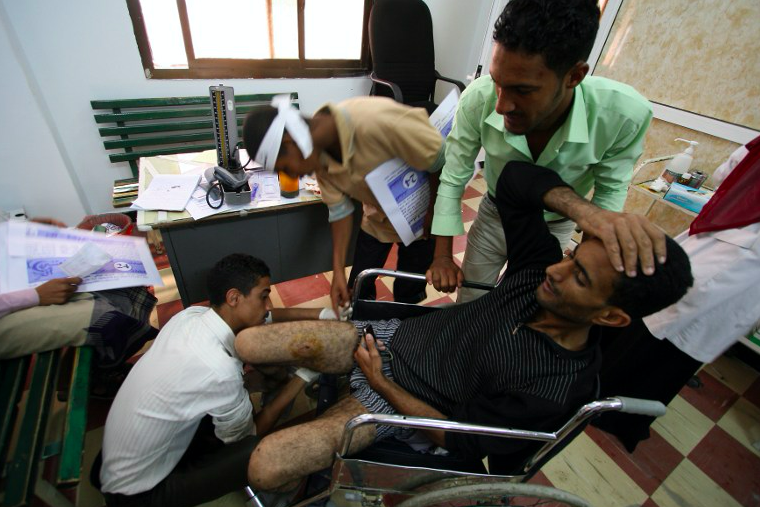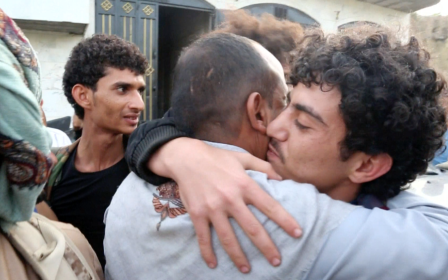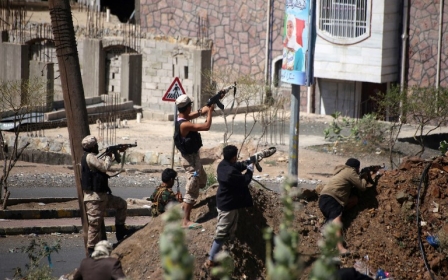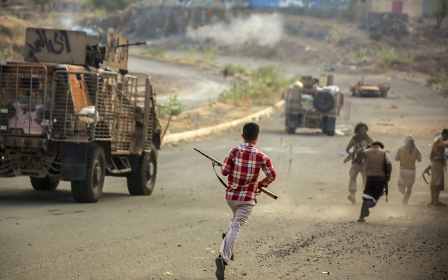Houthis may lift Taiz siege to allow thousands of injured to leave

TAIZ, Yemen – Maha Ibrahim was watching her cow graze in a field on the outskirts of Taiz when a Houthi rocket fell near her and propelled a piece of shrapnel into her back.
Her brother rushed the 38-year-old to al-Thawra, the largest hospital in the city, but there was little doctors could do. They administered first aid, but said they could not perform the surgery she desperately needed.
Her brother Ridha then went from hospital to hospital to plead with other doctors to help his sister, but they too had to turn him away. That was in April, and her situation has only continued to deteriorate since. If she does not get the help she needs, doctors say she could be permanently paralysed, with the lodged shrapnel already pressing on her spine.
With the city under siege by Houthi fighters for almost a year, and 80 percent of the hospitals in the war-torn city now forced to close due to the fighting that began in March 2015, resources have been almost totally depleted even as casualty figures continue to rise almost daily.
There are currently believed to be some 8,000 sick or injured people in Yemen’s third largest city. Many have been left stranded for months on end with little or no medical care. A local official told Middle East Eye that 200 people were in critical condition and need immediate surgery.
New MEE newsletter: Jerusalem Dispatch
Sign up to get the latest insights and analysis on Israel-Palestine, alongside Turkey Unpacked and other MEE newsletters
Yet as the war has dragged on, their plight has only increased and their chances of recovery dwindled, as they are unable to leave, and medicines unable reach them.
After months of pressure from residents and the country’s politicians, however, this deadly impasse could be about to change, with the Houthis suggesting that they will open the roads for the ill and injured.
The head of the Houthis' revolutionary committee Mohammed Ali al-Houthi announced last week that he had formed a committee, headed by Taiz governor Abdu al-Ganadi, to decide who was eligible to leave for treatment.
Treatment in Sanaa
According to Houthi, the Houthis – a rebel group which overran much of Yemen early last year - will now try and move the neediest to state-run hospitals in Sanaa and the city of Ibb that rests on the road north from Taiz to the capital. While anti-Houthi forces made sweeping inroads north last year, the advance has largely stalled and both cities remain under Houthi control.
The Houthis are also looking into moving people to other hospitals in Taiz that are under Houthi control and have not been as badly hit by the siege, Houthi told MEE.
Saba News Agency, which is under the control of the Houthis, said Houthi formed the committee after appeals from some injured people who were "deluded" to join the fighting and said they would like to return to civilian life.
The shift comes after a string of appeals were made to the Houthis' national leader, Abdul Malik al-Houthi, and former president Ali Abdullah Saleh who have allied against President Abd Rabbuh Mansour Hadi and his backers.
Shawqi al-Qadhi, a member of the parliament and a supporter of the anti-Houthi resistance, last week took to social media to urge the Houthis to step up and help the injured.
"Although [we have] the war in Yemen, we still believe in one religion and we have the same morals, so I appeal you to treat the injured people of Taiz in Sanaa hospitals at the expense of our government's budget, which is under your control," he wrote.
If enacted, the strategy could prove a game-changer for the ill and injured who have had to wait or pay to be smuggled out of the city through the mountains to seek help in the capital or abroad – feats that are either too dangerous or too expensive for most injured people to attempt.
Some Taiz residents have welcomed Houthi’s decision to try and provide more care.
"I am not a Houthi supporter, and also I did not fight against the Houthis - we are sellers of vegetables and need to live peacefully,” Ridha said.
“So I [have] started to contact the committee of the Houthis in Taiz to take my sister to Sanaa for treatment, as there are hospitals with qualified doctors in Sanaa.”
Lack of trust
But many others say that they do not trust the Houthis and fear going into Houthi-controlled areas. For them the choice is simple – travel abroad or die in their homes.
Azzam al-Fahl, 35, joined the anti-Houthi popular resistance on the Thaabat front east of Taiz in June 2015. His right leg was injured in February this year and he has needed surgery to repair the damage ever since.
"I need to do the operation on my leg,” Fahl told MEE. “The hospitals in Sanaa can do the operation, but I do not trust the Houthis, and I believe that they are preparing for a trap to detain the injured people in Sanaa.”
Fahl tried travelling to the southern city of Aden that is officially controlled by the government but said that the southern resistance, which is allied with Hadi and opposes the Houthis, has been stopping northerners from travelling south.
"My dignity does not allow me to flatter the southern resistance in order to be allowed to enter Aden,” he said.
“Even if the Houthis didn't bother me in Sanaa, my dignity would not allow me to receive treatment from killers."
“So I prefer to stay at home, until the government can take me abroad," he added.
Responsibility
Moaath al-Yaseri, a leader of the resistance in Taiz province, told MEE that the Yemeni government has to take on the responsibility of treating the injured and that it is irrational to try and appeal to their opponents for help.
"There are some supporters of the resistance [who have] appealed to the Houthi rebels to treat the injured people at the expense of our country's budget, but this was not the attitude of the resistance and it is the opinion of the supporters themselves,” he said.
Some residents are holding out hope that the international community will step in to help the wounded.
"The residents of Taiz are tired of the war, and they cannot bear more suffering, so we are appealing to the international community to help civilians in Taiz,” Abdul Kareem Shamsan, the head of the Humanitarian Relief Coalition in Taiz province, told MEE.
“The [international community] needs to stop the civil war in the city and treat the injured people."
But as the war rages on, and the peace talks in Kuwait continue to produce few results, frustration and anger is growing.
"I was willing to sacrifice myself for the sake of the country but now I cannot not find anyone to help me to do my operation,” said Fahl.
“I am afraid our colleagues on the frontlines will stop fighting when they see the bad conditions we are in.”
Middle East Eye delivers independent and unrivalled coverage and analysis of the Middle East, North Africa and beyond. To learn more about republishing this content and the associated fees, please fill out this form. More about MEE can be found here.




